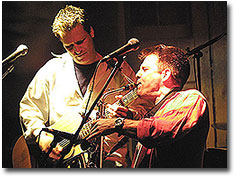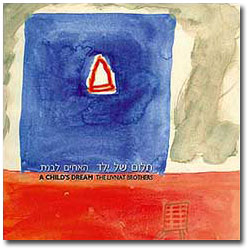Jazz With Yiddishkeit
By
Yossi Harsonski
 There is a kind of music that, when it is playing, you don't have to put on a kipah to feel that it links you up to something big and deep within you. Whereas the Mizrahi musician links easily and complex-free to his cultural origins and to the mystical poetry and rhythm of his parental home, Ashkenazi musicians tend to ignore their roots - their cultural fathers are Jimmy Hendrix and Bob Dylan, or Charlie Parker and Stevie Wonder. 'Jewish music' in their case is anachronistic, smacking of the Galut. But it can also be done differently - by combining the two.
The Livnat brothers visited the jazz clubs of Poland in order to discover their origins; they did this in their language - jazz. I came to Camelot in order to hear sounds that had filled the air in Poland during March, 2000; Jewish music that had been recorded there by the jazz station during the tour of two Israeli musicians with roots stretching back to Warsaw, who tried to strike a chord on FM106.8. Arik Livnat on saxophone and flute, and his brother Aviv Livnat on guitar amazed the audiences in Warsaw, Lodz, Cracow, and Poznan jazz clubs. Their point of departure was a show called 'Songs Hand-Hammered in Copper,' a journey tracing the works of their grandfather, the artist Arieh Merzer, who immortalized the Jewish way of life in Poland with his hand-hammered copper reliefs.
On the way they discovered 'Jewish Folk Songs,' a work that contains 12 Jewish motives. The Livnat brothers knew nothing about traditional Jewish music; they had no Yiddish, but the result of tracking the hand-hammerings gave birth to Jewish Jazz that was played in 'The Aquarium' and the 'Blue Note' in Warsaw. In their appearance in 'Camelot' they generally succeeded in avoiding kitch, despite the fact that their works contain hackneyed traditional Yiddish songs. Their orientation is pure jazz. For instance, the discourse between the saxophone, the guitar and the voice winds towards the not obviously sentimental in 'Zol Zayn,' a piece with outstandingly mature fusion. Jazz alone would not have brought out in Arik such soulful expressiveness. Aviv Livnat is wonderful in the impromptu dialogue between guitar and voice. In general, the two brothers are very versatile musicians who have mastered different styles. They need to polish up the show slightly, with a little less Yiddishkeit and a little more authentic fusions such as 'Close Your Eyes,' which was written by a father who lost his daughter in the Holocaust.
But even in its present format the show is a moving attempt at combining Jewish music with jazz.
There is a kind of music that, when it is playing, you don't have to put on a kipah to feel that it links you up to something big and deep within you. Whereas the Mizrahi musician links easily and complex-free to his cultural origins and to the mystical poetry and rhythm of his parental home, Ashkenazi musicians tend to ignore their roots - their cultural fathers are Jimmy Hendrix and Bob Dylan, or Charlie Parker and Stevie Wonder. 'Jewish music' in their case is anachronistic, smacking of the Galut. But it can also be done differently - by combining the two.
The Livnat brothers visited the jazz clubs of Poland in order to discover their origins; they did this in their language - jazz. I came to Camelot in order to hear sounds that had filled the air in Poland during March, 2000; Jewish music that had been recorded there by the jazz station during the tour of two Israeli musicians with roots stretching back to Warsaw, who tried to strike a chord on FM106.8. Arik Livnat on saxophone and flute, and his brother Aviv Livnat on guitar amazed the audiences in Warsaw, Lodz, Cracow, and Poznan jazz clubs. Their point of departure was a show called 'Songs Hand-Hammered in Copper,' a journey tracing the works of their grandfather, the artist Arieh Merzer, who immortalized the Jewish way of life in Poland with his hand-hammered copper reliefs.
On the way they discovered 'Jewish Folk Songs,' a work that contains 12 Jewish motives. The Livnat brothers knew nothing about traditional Jewish music; they had no Yiddish, but the result of tracking the hand-hammerings gave birth to Jewish Jazz that was played in 'The Aquarium' and the 'Blue Note' in Warsaw. In their appearance in 'Camelot' they generally succeeded in avoiding kitch, despite the fact that their works contain hackneyed traditional Yiddish songs. Their orientation is pure jazz. For instance, the discourse between the saxophone, the guitar and the voice winds towards the not obviously sentimental in 'Zol Zayn,' a piece with outstandingly mature fusion. Jazz alone would not have brought out in Arik such soulful expressiveness. Aviv Livnat is wonderful in the impromptu dialogue between guitar and voice. In general, the two brothers are very versatile musicians who have mastered different styles. They need to polish up the show slightly, with a little less Yiddishkeit and a little more authentic fusions such as 'Close Your Eyes,' which was written by a father who lost his daughter in the Holocaust.
But even in its present format the show is a moving attempt at combining Jewish music with jazz.
Moving Moments
By
Yossi Harsonski

The Livnat Brothers, 'A Child's Dream' (Golden Peacock)
The first eight minutes of 'A Child is Dancing' encompasses the essence of the musical world of the Livnat brothers who, until today, were known chiefly for their integration of Jewish music with jazz. This is a melodious piece which starts off in a low-key and then flows in an emotional and very melancholic strain with a jazz intonation, and at the same time has a mood of something French a la Francis Lee and Michel Legrand. Aviv (guitar and melodies) and Arik (wind instruments, keyboard, and melodies) condensed in this one disc original music that they wrote for different media, for dance, movies and theater. The reflective, plaintive sound of 'A Child's Dream' on soprano saxophone is reminiscent of Pat Metheny's ambient music. Here, too, the brothers manage to create a mystic atmosphere embellished with faint piping effects.
The first two pieces are taken from 'A Gesture to Fellini' in 'The Curtain Rises' 1994. The soprano saxophone continues its yearning also in 'Nostalgia', the music of the film 'Phone Me' by Barak Shakin; Arik Livnat's flute sounds trillingly in 'Lullaby,' written for 'Blood Wedding' by Lorca, that was staged at Yoram Levinstein's School of Acting. A pity the piece came to an end so quickly - it could have been developed further. And from the same play, too, came 'Prayer,' with a special low-key element combined with rhythm.
The Livnat brothers are musicians who take nothing for granted. They absorbed Jewish music and jazz but are searching all the while and achieving poetry in a musical fusion full of soul. In 'Good Boys' Aviv has a turn at singing, but to my mind the Livnat brothers would do well to keep to their instrumentation, which is much better at radiating feelings and atmosphere than their vocalization.
All in all, they deliver creative moments of great beauty and even deep emotion in a disc that presents an array of the best of their gifts and musical colours
29.9.2002
![]()


